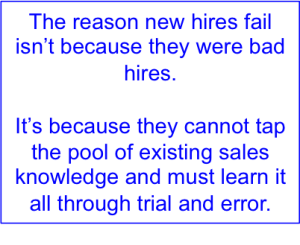September 20, 2016

Picture this – it’s the third time that you’ve given feedback to an employee and their behavior still hasn’t changed.
How frustrating!
Giving an employee feedback is hard enough to do as it is. Most managers dread doing it and employees can get turned off if it’s done wrong.
You might think that it’s not a big deal if you don’t give feedback, but employees are craving for more feedback.
In fact, 65% of employees say that they want more feedback.
Employees want corrective feedback even more than praise. From a Harvard Business Review article about feedback:
“People want corrective feedback, as we’ve defined it, even more than praise, if it’s provided in a constructive manner. By roughly a three to one margin, they believe it does even more to improve their performance than positive feedback.”
They need it to help them improve. The concept of mastery and constantly getting better is what truly motivates an employee, and feedback helps them get there.
But an important question to ask, is if employees crave feedback and want it even more than praise, why does some feedback not get listened to?
What is it about the feedback that makes an employee ignore it? Is it the feedback giver? The content of the message? More importantly, how do we get employees to listen to our feedback every single time?
I’m going to share a few tips, but first I think it’s important to understand why feedback is so sensitive.
Simply put, feedback is seen as a social threat. Our brains are protective of us, and so they go out of their way to make sure we always feel like we’re in the right, even if we’re not.
When we receive criticism, our brain tries to protect us from the threat it perceives.
David Rock, author of Your Brain at Work and the guy who coined the term “neuroleadership”, came up with the SCARF model to explain the social threats that our brains perceive.
SCARF stands for Status, Certainty, Autonomy, Relatedness and Fairness.
- Status is a person’s position relative to others. If someone’s status is threatened, they’ll feel like you’re talking down to them.A good way to fix this is to encourage employees to give themselves feedback on their own work. Ask them something like “How do you think that went? Was there anything you think you could improve on for next time?”
- Certainty is all about the future. How certain are you with what’s going to happen. At work, this is related to job security.A good way to fix this is to set clear goals with your team and remind employees of the goal when you’re giving them feedback.
- Autonomy is about how autonomous someone feels over a project or task they’re working on. If the feedback they get is perceived as micromanaging or reducing that autonomy, they’ll get threatened.A good way to fix this is to offer an employee a few ways of doing a task and then having them decide, so that they maintain that sense of control.
- Relatedness is how you relate to someone else and if you perceive them as an enemy or a friend. If feedback is demeaning or is made to sound like they’ve failed, they can feel threatened.A good way to fix this is to make a personal connection. When giving feedback to an employee, you can say something like “I remember when I had to do that, I was so bad at first, but then I did this thing that doubled my results…”
- Fairness is all about how they perceive they’re being compared to everyone else. If they think they’re getting more feedback than other employees, they’ll feel threatened.A good way to fix this is to make it clear that everyone is getting a similar amount of feedback. Work hard to make an employee feel like they’re not being singled out.
Tips To Get Your Feedback Listened To
Here are a few tips you can use to make sure your employees consistently listen to your feedback.
Be Honest And Direct
An important part of having your feedback listened to is just being honest and direct. It seems simple and obvious, but it’s amazing how many managers avoid giving honest and direct feedback.
What they’ll often do instead, is something called the “feedback sandwich” where you put feedback between two pieces of praise to make the feedback sound less harsh.
But this often doesn’t work.
In a research paper called Tell Me What I Did Wrong that looked at how different people responded to feedback, they found that the feedback sandwich doesn’t work.
From the research paper:
The negative feedback is often buried and not very specific.
They say that a much smarter idea is to just be straightforward.
Earn Respect
This might be the most important tip on this list.
No matter how structured or polite the feedback is, if an employee doesn’t respect you, they won’t listen to it.
According to the American Psychological Association1 you need to be seen as a “credible source of advice”. If not, the feedback won’t be listened to.
Employees need to feel as if you have their best interests at heart. Earning respect takes time, but then feedback will be consistently listened to.
Tell Employees You’ll Follow Up Quickly
This is all part of building trust with your employees. One of the biggest problems with feedback in organizations that no one thinks anyone will do anything with feedback they give.
According to a CareerBuilder survey:
48% of employees would stay with a company that asks them what they want and acts on that feedback.
If you show them that you’re taking the process seriously, then they’ll take it seriously too. That will help you build an overall culture of feedback.
Express Your Feelings
You never want to make the feedback a personal attack on someone. You want the feedback to be focused on the behavior, not the person.
A great way to get feedback listened to is to express how the behavior you want changed is making you feel.
For example, if you say, “When you do X, it makes me feel Y..” This allows the recipient to empathize with you and perceive it as an honest suggestion.
Listen To Your Employees
The more you listen to your employees, the better your ability to give effective, relevant feedback.
Research from Zenger/Folkman finds that the more you listen, the better employees think you are at giving feedback.

Giving relevant feedback is an important part of getting it listened to. Listening to your employees shows that you care and will help you build that trust and respect with them.
Set Clear Goals When Giving Feedback
According to research in the Journal of Applied Psychology2, the best way to improve performance is to not only make your feedback specific, but to tie it to a specific goal.
That way, employees know very clearly if they’ve improved how you wanted them to.
Without a specific goal, it becomes hard to properly evaluate what effect the change of behavior had.
Give Feedback Frequently
They say that practice makes perfect. You’re much more likely to have feedback listened to if employees are used to a culture of frequent feedback.
Research shows that companies that implement regular feedback experience 14.9% lower turnover rates than companies that don’t implement regular feedback.
It’s possible that employees might not listen to feedback the first few times you give it, which is why creating a culture of regular feedback is so important.
Follow Up
Of course you should be following up with any feedback you give to make sure it was implemented and to hold an employee accountable, but it turns out that following up on feedback helps improve long-term performance.
In a study done with 252 managers over 5 years3, researchers found that managers improved more in years when they discussed the previous year’s feedback with their direct reports than in years when they did not discuss the previous year’s feedback.
The more you follow up with feedback and then make adjustments, the more chance you have to improve performance, because you’re actively monitoring it.
Do You Have Any Feedback Tips?
Any tips you can share for getting your feedback listened to? Let us know in the comments below!
Business & Finance Articles on Business 2 Community(45)










